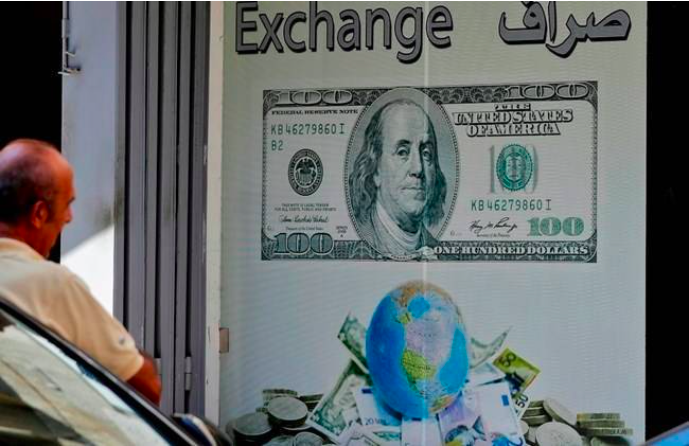
The Lebanese lira hit an all-time low again yesterday, trading at LL30,000 to the US dollar, despite recent measures from the central bank aimed at quelling its freefall. (Credit: Joseph Eid/AFP)
Want to get the Morning Brief by email? Click here to sign up.
For the second consecutive day, the Lebanese lira slid to an all-time low, reaching LL30,000 to the US dollar on the parallel market yesterday. Late yesterday evening, money exchangers on the parallel market were buying the lira for LL30,000-LL30,050 to the dollar. Yesterday morning, in response to the ongoing devaluation, the Energy Ministry raised fuel prices again: 20 liters of 95-octane and 98-octane gas rose by LL 15,600 to LL351,400 and LL363,400 respectively, while the diesel price increased by LL 24,200 to LL360,400. The price of a tank of household gas also rose by LL20,700 to LL319,300. The Lebanese lira has been on a downward trend ever since the central bank decided to raise the withdrawal rate for the so-called “Lebanese dollar,” or “lollar” deposits in commercial banks from LL3,900 to LL8,000. Circular 161, subsequently released by the central bank and intended to quell the freefall, stipulates that customers can exchange their “lollars” for cash dollars at the Sayrafa rate for the months of December and January, but this has failed to U-turn the national currencies negative momentum.
Firass Abiad yesterday expressed wariness about reopening schools amid the worsening COVID-19 situation in the country. The health minister said a return to in-person school would likely “accentuate the spread of the virus”; however, he also pointed out that hospitals’ capacity to accommodate COVID-19 cases has increased by 30 percent. Abiad also emphasized that schools could mitigate some of the risk of virus spread by complying with protective measures, such as wearing masks at all times and conducting regular antigen tests. Abiad nonetheless again highlighted the precariousness of Lebanon’s health sector, stressing in particular the impact emigration has had since 2019 on the number of medical professionals available to work in facilities. On Tuesday, Lebanon registered its highest number of new daily cases yet this winter, with 5,087 people testing positive for the coronavirus. The number of people in ICUs with the illness however remained static at 347.
Both Lebanon’s president and the leader of the Future Movement added their voices yesterday to a chorus of political figures seeking to distance Lebanon from Hezbollah leader Hassan Nasrallah’s criticisms of Saudi Arabia. The NNA quoted President Michel Aoun saying that good relationships “must be from both sides because it is in Lebanon’s and the Gulf countries’ interest.” This was followed by a strongly worded tweet from former Prime Minister Saad Hariri, who called out the Shiite party for its “insistence on antagonizing Saudi Arabia and its leadership,” which he characterized as a “continuous form of adventurism in Lebanon, its role and the interests of its children.” In a speech Monday, Nasrallah lashed out at Saudi Arabia, saying, “the terrorist is the one who keeps hundreds of thousands of Lebanese hostage and threatens Lebanon through them.” Against the backdrop of an as yet unresolved diplomatic rift with the kingdom, Nasrallah’s comments drew a quick reaction from Prime Minister Najib Mikati, who said that the remarks did not represent the Lebanese government or the majority of Lebanese and asked Hezbollah to “spare Lebanon and the Lebanese the ugly and sectarian political tensions.” In response, two of Hezbollah’s MPs criticized Mikati on Tuesday for defending Saudi Arabia, characterizing it as an insult to the Lebanese and representing Mikati only.
Prime Minister Najib Mikati has vowed to make every possible effort to support the army. His statements came after a meeting with the head of the army, Joseph Aoun. Mikati said the military was essential in protecting Lebanon and its people. However, he did not specify exactly how he was planning to do so, especially amid the cabinet stalemate. The ongoing financial crisis has had a crushing effect on the country’s security servicemen, whose average salary ranges from LL1.2 million to LL2 million a month depending on rank, or $40-$66 dollars at the present parallel market exchange rate. Many have been forced to work second jobs to make ends meet. Meanwhile, the military has become increasingly reliant on foreign aid to provide basics, such as food and health care, for its enlisted.